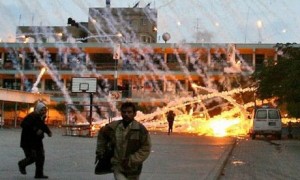Recent events in Ukraine and Syria have put countries on notice that it is time for nations to reassess and strengthen international law on the use of cruel weapons.
A report titled “Incendiary Weapons: Recent Use and Growing Oppositions” will be distributed and considered at the annual meeting of countries that are party to The Convention on Prohibitions or Restrictions on the Use of Certain Conventional Weapons Which May be Deemed to be Excessively Injurious or to Have Indiscriminate Effects (or the Convention on Certain Conventional Weapons). At its core, the CCW aims to prohibit the use of weapons which are considered excessively injurious or whose effects are indiscriminate.
Incendiary weapons are defines as any weapon or munition primarily designed to set fire to objects or to cause burn injury to persons through the action of flame, heat, or a combination thereof, produced by a chemical reaction of a substance delivered on the target.
The Report sets out two primary points for consideration: (1) Adopting a broader, effects-based definition of incendiary weapons that encompasses multipurpose munitions with incendiary effects, such as those containing white phosphorus; and (2) Prohibiting the use of all incendiary weapons in civilian areas, regardless of whether they are air dropped or surface launched.
Protocol III, the section which the report aims to revise, has been criticized for being too broad. The report seeks to amend the definition of incendiary weapons to include munitions with white phosphorus, which is currently not covered by the language. White phosphorus is a material made from a common allotrope of the chemical element phosphorus that is used in smoke, tracer, illumination and incendiary munitions. As an incendiary weapon, white phosphorus burns fiercely and can ignite cloth, fuel, ammunition and other combustibles.
Are the proposed amendments going far enough? Are there better ways to mitigate the use of cruel weapons? And, are there even effective ways of regulating the use of these weapons?
Sources: Human Rights Watch, Convention on the Use of Conventional Weapons

I agree that the international community should make an effort to prohibit the use of incendiary weapons. However, I think it is extremely difficult to regulate the use of these weapons. During times of war, it is difficult to regulate what weapons are used since there are essentially no set rules of war. The best that the international community can do in such situations is to pass resolutions such as the one proposed in your article and condemn any group or country that uses incendiary weapons. Also, by spreading awareness of the use of such weapons by a group in a conflict, the international community is less likely to support them and thus be counterproductive to their cause.
Furthermore, countries that are manufacturers of incendiary weapons should stop producing them which will help decrease the supply of these weapons around the world and decrease their use in the future.